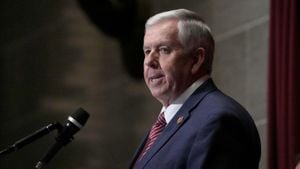Protests erupted violently on November 25, 2024, against the Vaishno Devi ropeway project, leading to clashes between demonstrators and law enforcement officials at Katra, located within the Reasi district of Jammu and Kashmir. Amid mounting tensions surrounding the proposed ₹250 crore project, which seeks to install a cable car system along the trek route to the popular Vaishno Devi shrine, concerns escalated over its potential impact on local livelihoods. Warnings of job losses from shopkeepers, palanquin carriers, and pony owners have fueled resistance among the community, creating ripples of unrest.
During the protest, one policeman sustained injuries. Reports indicate the occupation of public spaces by angry protestors, demonstrating their disagreement with governmental plans they believe threaten their traditional means of income. Many locals fear the introduction of the cable car system would diminish foot traffic along the historic routes, negatively affecting business operations for small vendors and workers dependent on the shrine’s pilgrimage tourism.
The conflict was marked by physical confrontations, as police attempted to disperse crowds protesting the plan. Officers deployed tear gas to manage the unrest, which has captivated not only local but national media attention. “We are merely trying to protect our livelihoods,” lamented Vijay Kumar, one of the local shopkeepers involved. “The government says this project is for development, but they have done nothing to assure us about our jobs.”
Local leaders have made headlines with their calls for the government to engage with constituents more meaningfully on development initiatives. Jammu and Kashmir’s Lieutenant Governor has defended the project, asserting, “There's no going back on development projects.” Yet, he acknowledged the necessity of addressing public grievances, promising dialogues with concerned parties to seek potential resolutions.
The Vaishno Devi shrine draws millions of pilgrims each year, and the proposal of the ropeway promises to make access easier for those who may otherwise struggle with the arduous trek. While some view it as progress and modernization, opposition groups argue such advancements come at the cost of local tradition and employment. The debate over the cable car system encapsulates the broader struggles between development, preservation, and community welfare.
Protest organizers celebrated their fourth consecutive day of mobilization on Monday, signaling their intent to escalate efforts until satisfactory measures are implemented. Notably, prominent local figures have joined the cause, raising awareness of the underlying economic vulnerabilities. “This isn’t simply about the ropeway; it touches on our identity as locals and the character of our beloved shrine,” asserted Neetu Sharma, another protester.
The events have reverberated throughout the community, showcasing deep-rooted anxieties about the future amid rapid changes. Many question whether development projects can truly align with the diverse interests of local populations. For now, the standoff persists as authorities monitor the situation closely, aware it has caught national political significance. With negotiations on the horizon, the potential for resolution remains uncertain.



